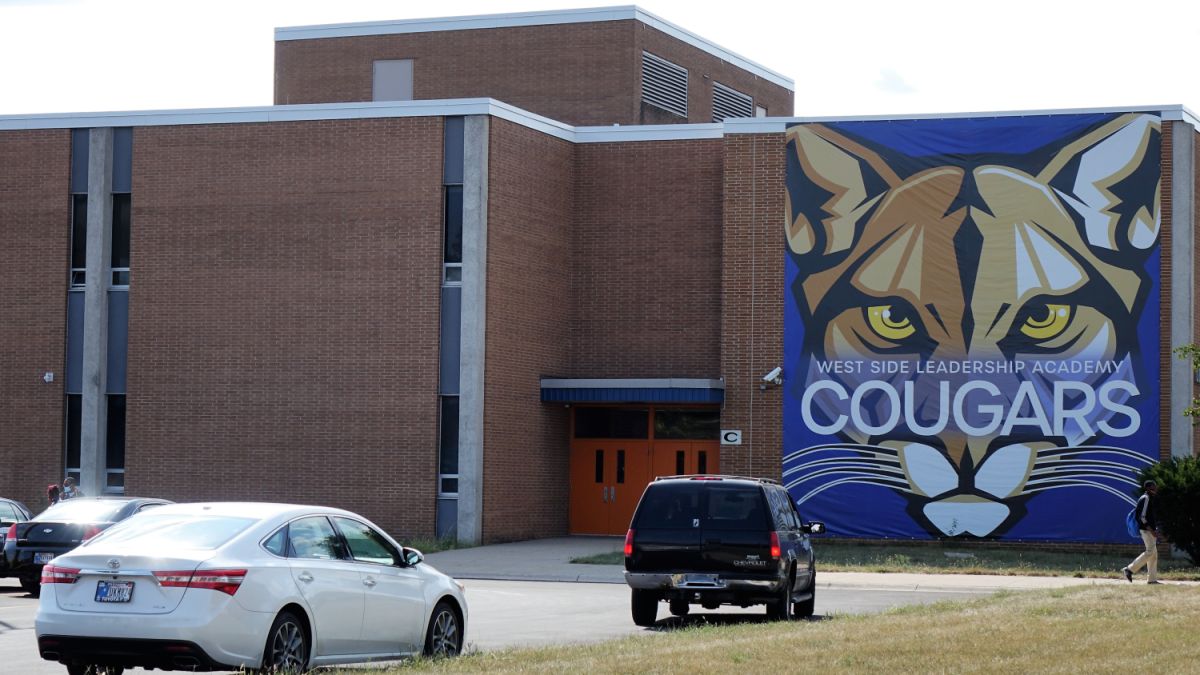
Sixty-one percent of students who live in the Indianapolis Public Schools district boundaries attend other districts, public charter schools or private schools.
WFYI fileHave a news tip for WFYI's education team? Share it here.
Indiana lawmakers have introduced a bill that would dissolve the state’s largest public school district.
House Bill 1136, authored by Rep. Jake Teshka (R-North Liberty), proposes converting 50 schools in the Indianapolis Public Schools district into charter schools due to enrollment shifts.
Four other school districts would also be disbanded under the legislation: Gary Community Schools, Tri-Township Consolidated Schools in LaPorte County, Union Schools southeast of Muncie, and Cannelton City Schools near the Kentucky border in Perry County.
The bill states that if more than 50% of students residing within a school district’s boundaries were enrolled in schools not operated by the district as of Oct. 1 of the previous year, the district must be dissolved. School districts’ average daily enrollment is determined on that date annually.
If the bill is passed and signed into law by incoming Gov. Mike Braun, the process to dissolve all five school districts would begin in July. While Braun is a strong advocate for school choice and expanding options for private school attendance, he has not specifically emphasized charter schools in his agenda.
Update: Legislation to dissolve IPS, Gary, other school districts fizzles out. Here's why
The legislation is drawing local and national attention, with parents and pundits taking to social media to voice alarm or praise, ahead of this week's start of the Indiana General Assembly's 2025 legislative session.
The bill, if approved, would require 68 public schools across the five districts to convert to charter schools by July 1, 2028, according to the bill’s fiscal impact report. Schools with the lowest scores on state assessments, such as ILEARN and IREAD-3, would transition first.
Each school corporation's locally elected school boards would also be disbanded. HB 1136 establishes "a new governing board, requirements, and procedures" for each school. Each board would consist of seven members, including appointees from the governor, local leadership, and the director of the Indiana Charter School Board. Unlike traditional school boards, these members would not be elected by voters.
The five districts
Each of the affected school districts face unique challenges while serving the academic and personal needs of its students.
In Indianapolis, about 49,700 students live within IPS boundaries, but more than 30,000 of them attend other districts, public charter schools, or private schools using vouchers. IPS meets the bill’s threshold, with 61% of resident students enrolled elsewhere, according to the state’s public corporation transfer report.
The seven-year state takeover of Gary Community School Corporation ended less than a year ago following bi-partisan approval for the district to operate under local control. During the intervention, thousands of families left the Lake County district and chose other options for school. Now, only 35% of resident students currently attend Gary schools.
At Union Schools, a small Randolph County district near Muncie, 65% of the 370 resident students attend schools elsewhere. Despite enrolling more than 7,600 students from outside the district in its virtual Indiana Digital Learning School, Union Schools would still be disbanded.
In the small towns where the Cannelton and Tri-Township school corporations are located, more than half of local children attend schools in nearby districts.
Response from IPS, Teshka
Teshka, in a statement sent to WFYI Monday, said he authored the bill to ensure school corporations are giving children "the best education possible and to find solutions in districts where the current governance is failing its students."
"This bill would only apply to school districts where more than half of the students and families living within the school district's boundaries are choosing to attend other schools, meaning their property taxes are funding a school system they don’t attend," the statement continued. "This is an important conversation to have, and I look forward to hearing from parents, educators, administrators and other stakeholders on the best path forward to ensure every Hoosier student receives a quality education."
In a statement Friday, the IPS Board of Commissioners said they are committed to collaborating with lawmakers "to advocate for policies and resources that strengthen public education and protect our children’s futures."
"The IPS Board of Commissioners recognizes the importance of addressing pending legislation that will affect IPS and its potential impact on our students, families, and community.
The bill was filed just before current and former Indianapolis leaders called on IPS to "proactively commit to transforming the district to ensure its sustainability."
"The legislature has taken notice and seems ready to act if needed," the statement reads. "It is preferable, however, that any structural changes in IPS are driven locally and to the benefit of our Indianapolis students and community."
‘This is shocking’
IPS has faced a steep decline in enrollment over the past several decades and attempted to address it through school closures, partnerships with charter schools and academic adjustments. In 2006, about 37,500 students were enrolled in the district.
Today, IPS enrolls a total of 31,300 students. This includes students enrolled at charter schools operated at an IPS facility or a charter school that is in partnership but managed independently within the district. Out of that total, 21,000 students are enrolled at district-managed schools.
IPS is in the midst of an academic and structural overhaul that includes reconfiguring grades at elementary and middle schools and the closure of some schools in 2023.
The state largest teachers union said the proposed legislation would “unfairly target school districts based on student transfers.”
"It's very difficult for us to wrap our heads around why it is that all of a sudden our state legislature would be pushing to take away a choice from parents because these parents, who are in the public schools, have actively chosen to be there," said Jennifer Smith-Margraf, Indiana State Teachers Association's vice president. "They do have other options in Indianapolis, and that's not the option they've taken."

But families are still choosing IPS, said David Marcotte, executive director of the Indiana Urban Schools Association. He said the bill undermines parental choice and would lead to a “total upheaval” of the district.
"There's a significant number of parents who are choosing to send their children to the traditional public school,” Marcotte said. "It just kind of goes against the policy that we've seen in Indiana of parent choice."
A student transferring from one public school district to another district is the state's most popular type of school choice, a WFYI analysis found.
In 2014, IPS leaders helped craft a law that allowed the district to partner with charter school operators — a dramatic change after years of conflict between the traditional district and choice advocates. Since then, the law has expanded and today IPS has contracts with 25 charters, also known as innovation network schools.
Charter schools are public schools overseen by a board that is not elected by voters. The schools get public funding from the state that pays for most of the cost of educating students. But they don’t typically receive local property tax revenue.
“IPS did agree to move into this area now because they did, they're going to possibly lose their district,” Marcotte said. “That is shocking.”
Smith-Margraf said the bill’s changes would have dramatic effects on educators at these schools and their communities.
“It creates a lot of uncertainty for teachers, many of them who have dedicated their life to working in the public school system because it will undercut all of the agreements and working conditions that they are familiar with,” Smith-Margraf said.
About 2,050 educators across the five districts are represented by a teachers union. If the bill passes, collective bargaining at the districts’ 68 schools would likely end.
Charters want change
Longtime charter advocate Scott Bess said he believes House Bill 1136 is meant to start a conversation.
Bess ran the adult high school charter network Excel Center before he founded the Purdue Polytechnic High Schools charters — two of which partner with IPS. He recently launched the Indiana Charter Innovation Center, which fills a role as an association to advise and support the state’s charter schools. He also sits on the State Board of Education.
Bess said IPS and other districts don’t need to be dissolved to create change but the bill could lead to discussion on the subject.
“You can't have one entity that essentially is sucking up all of the local money and property tax money and freezing out everybody else when more than half of the parents had chosen those options,” Bess said.
About 37,000 students attended charter schools across the state last year, including virtual charters, according to a state funding report.
A bipartisan group of Indianapolis politicians and education advocates, including two former mayors, urged IPS to address financial and operational challenges and share resources with charter schools in a letter shared Friday.
Bess said although he was not involved in the letter, he agrees with its sentiments, especially a need for fundamental structural change at the Indianapolis school district.
“It's time that we take a step back. And yes, we want to make sure parents have choices,” Bess said. “If they want to choose a traditional neighborhood district school, they can, but that district has to operate under the same rules, if you will, as everybody else.”
House Bill 1136 is co-authored by Rep. Jeffrey Thompson (R-Lizton) and Rep. Tim O'Brien (R-Evansville). The General Assembly's 2025 session begins on Wednesday.
This story was updated to include a statement from Rep. Jake Teshka (R-North Liberty), the author of the legislation.
Rachel Fradette is the WFYI Statehouse education reporter. Contact Rachel at rfradette@wfyi.org.
 DONATE
DONATE






 Support WFYI. We can't do it without you.
Support WFYI. We can't do it without you.